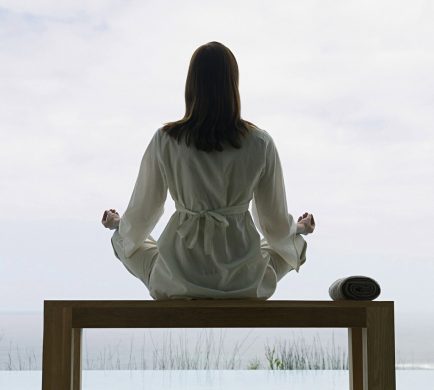Steps to make this “happiness molecule” … well … happy again
By Bryce Wylde, BSc, DHMHS
Being home 24/7 can mess up our day and night cycles. And the lack of social interactions can affect our moods. These days, we can also throw uncertainty and anxiety into the mix. It turns out that all of these things can impact our body’s supply of serotonin. Serotonin isn’t just a molecule that contributes to our happiness and wellbeing. It’s also very much in charge of the circadian rhythm. So, when it’s out of whack, our sleep cycles suffer..
Is it any wonder we’ve got a sleep deprivation epidemic going on? Lack of social interactions plus uncertainty and anxiety can affect your moods. Staying home 24/7 can mess up your day and night cycles.
Restorative sleep isn’t just a ‘nice to have’
The negative effects of a night spent tossing and turning amount to more than just walking around the next day with dark circles under your eyes. Chronic lack of sleep can contribute to weight gain and skin wrinkles. It may increase your risk of developing heart disease and diabetes. You may be less able to cope with stress. It can even reduce your libido!
Research has found that after 17 hours without sleep … that’s just one sleepless night … our alertness is similar to the effects of a blood alcohol concentration of 0.05 percent. That puts you in harm’s way, especially if you’re behind the wheel.
It’s also important to understand that our brains do their detoxifying when we are in deep REM sleep. The spaces between the brain’s cells enlarge, and accumulated waste can be flushed away.
Detoxifying is essential because accumulation of toxins is associated with cognitive decline. But it can’t happen during waking hours. It would be like a railway crew trying to repair tracks while the trains are running. Worse, sleep deprivation can become a
vicious cycle. Lack of sleep contributes to further lack of sleep. If you have trouble falling asleep or staying asleep, address the issue right away.
Serotonin helps with sleep and better moods
Stress, anxiety and disruptions in your routine can cause a slump in your body’s supply of serotonin, a molecule that contributes to your happiness and wellbeing. Serotonin is also in charge of the circadian rhythm. So, when it’s out of whack, your sleep cycles may suffer.
If you’re faced with this situation, these three simple science-based steps may help you build more serotonin in your system:
1. Balance your serotonin by balancing your blood sugar. Right now, your body may be craving cakes, breads and doughnuts. But as you follow a blood sugar balancing diet, you’ll have fewer of those cravings.
Stay well hydrated. And start eating more whole grains, fresh fruits and non-starchy vegetables, nuts, beans and seeds. Also try a modified intermittent fasting, where you wake up and fast until about noon.
2. Get better at sleeping. Your depth of sleep matters as much as how many hours you’re clocking on your pillow. Start with a cold, dark room; a comfortable mattress and some white noise. Use a sleep mask. Some people find sleep success by taking melatonin or tryptophan supplements but those only work
depending on your body’s chemistry. Plus, most of those products will put you to sleep but won’t necessarily help keep you asleep.
A more reliable approach is to take Zenbev within an hour of going to sleep. This is made from a balanced combination of simple, food-based ingredients that encourage the body to make melatonin at night and serotonin during the day. Zenbev contains pumpkin seed powder that is still wrapped in the intact protein bundle that allows for slow release. That’s why it works. It has to do with its molecular size. You can’t achieve the same thing by putting pumpkin seeds in the blender.
3. Bring your lunch outdoors. Anxiety burns serotonin. When you start feeling stressed, do some deep breathing. Better yet: Spend time in nature, especially a heavily wooded environment. Plant life emits negative ions, which increase serotonin output in the
human body.
Creative ways to improve your ability to sleep
In addition to the good sleep hygiene techniques mentioned above, here are some ideas you may not have considered.
1. Practice holding your urine. Nighttime trips to the bathroom are a common cause of sleep disruption. Not only do they interfere with your sleep cycle, you may have trouble falling back asleep. Getting used to holding your urine longer may help. Unless you have underlying bladder control or prostate issues, within three to five days, you may be much less likely to wake up during the night.
2. Give yourself an eating window of 8 to 10 hours each day. Avoid eating two hours before bed. This gives your stomach time to empty, which is especially helpful if you’re prone to indigestion when you are in bed.
3. Get moving. Exercise causes a surge of serotonin production. It also helps the body to manage blood sugar levels. This is why people who exercise frequently tend to be happier and more energetic overall. Just avoid strenuous exercise before bed.
4. Prep for the next day. Feeling worried or anxious about something that will happen the next day can rob you of a good night’s sleep. Get as much done the night before as possible, so you’re not waking up multiple times before your alarm goes off.
5. Try progressive muscle relaxation. If you feel wide awake when you should be starting to doze off, close your eyes and focus on relaxing your toes. Slowly move up your body, willing your mind to relax each set of muscles.
6. Get rid of the lumps. You may be tossing and turning due to an old, uncomfortable mattress or worn-out pillow. Do you get better rest at a hotel? It might be time for new bedding.
7. If you wake up during the night, don’t look at the clock. Checking the time may stimulate your brain because you start counting the hours of remaining sleep and thinking about the day ahead. If necessary, turn the clock so it faces the wall so you won’t be tempted to look at it.
8. Spend 10 minutes practicing gratitude before shutting off the lights. Keep a tablet or journal next to your bed, and write down all the positive things that happened during the day. Gratitude helps to counteract stress, and promotes relaxation. Some studies have found that gratitude journalizing may also increase sleep time and improve sleep quality.
Snoring may not just be annoying
Snoring can disrupt your sleep as well as your partner’s ability to rest. If you’ve been told that you snore, or you routinely wake up exhausted, with a dry mouth, have morning headaches or unexplained leg swelling, get evaluated by a sleep professional because it could be sleep apnea. This is a condition where your breathing repeatedly stops and starts while you’re sleeping.
Snoring is often a symptom of the most common type of sleep apnea called Obstructive Sleep Apnea (OSA). This is when the muscles in the back of your throat become too relaxed, limiting airflow. Left untreated, OSA is associated with high blood pressure, moodiness, heart disease, stroke, diabetes and perhaps even memory problems.
By the way, even if you don’t snore, you may be losing sleep if you’re a mouth breather. People who breathe through their mouths at night may sleep lighter, wake up more easily during the night and awaken less refreshed. Wearing an over-the-counter nasal strip may be a simple solution.
Sleeping and jet lag
For some people, jet lag can greatly interfere with their ability to function once they arrive at their destination. If you are traveling eastward, do your best to go to sleep at your usual time, even if that means excusing yourself from events happening the day of your arrival. You want your body to naturally adjust to your new time zone.
Slogging through the day doesn’t need to be your normal. Stop staring at the clock, counting the hours until morning, and instead start training your body to sleep through the night. Aim for quality of quantity. Your mind and body will thank you!







